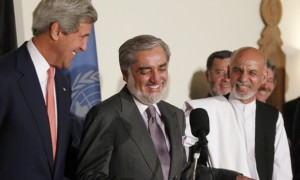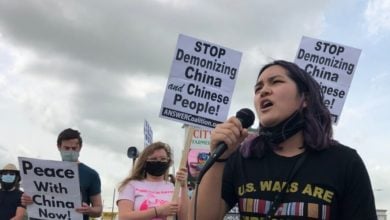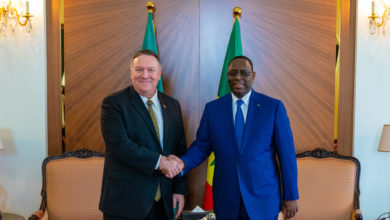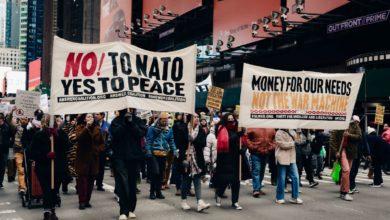Last week, the political crisis in Afghanistan intensified with presidential candidate Abdullah Abdullah’s announcement that his supporters will boycott the recount of votes from the June 14 run-off election. This is a troubling development for the imperialist powers who have been brutally occupying the country for the last 13 years. They are hoping to withdraw the bulk of their soldiers by the end of the year and turn over nominal control of the country to a loyal client government, but it is appearing that efforts towards this objective are falling apart.
The top generals and politicians of the United States and its junior NATO partners have long accepted that their war to subjugate Afghanistan is unwinnable. Even General David Petraeus, the commander of all occupying troops in Afghanistan from 2011-2012, said to journalist Bob Woodward, “You have to recognize also that I don’t think you win this war … This is the kind of fight we’re in for the rest of our lives and probably our kids’ lives.”
Behind their rhetoric about “defeating the Taliban,” the true aspirations of the imperialist coalition are much more modest. They are seeking to avoid the appearance of defeat by transferring most of the responsibility for fighting onto a puppet regime loyal to western capitalist interests.
This client state would be supported beyond the end of the year by a contingent of about 10,000 foreign troops with a limited role. To give the illusion of sovereignty, this new arrangement must be formalized by a treaty referred to as a “Bilateral Security Agreement.”
The success of this military transition from the imperialist perspective depends to a great extent on whether or not there is a stable national government that is consistently subservient to its imperialist patrons. The presidential elections held in April and June are critically important in this regard. Since the 2001 invasion, Afghanistan has been nominally ruled by President Hamid Karzai, but a number of factors have made him an unsuitable candidate to continue.
Karzai was expected to sign the BSA many months ago. However, the murderous abuse committed by the occupying forces has been so brazen that he ultimately bowed to mass pressure and refused to do so. Even though Karzai himself was installed by the U.S.-led occupiers, he saw no option but to push the responsibility for signing the BSA onto his successor. This raises the stakes in the current election considerably.
Elites compete to be U.S. imperialism’s main partner
The two main candidates in the election are Abdullah Abdullah and Ashraf Ghani. Abdullah is a longtime collaborator with U.S. imperialism, whose service extends back into the 1980s when he joined the counter-revolutionary forces fighting to overthrow the socialist state created in Afghanistan after the 1978 revolution. He then joined a coalition of groups called the United Islamic Front, also known as the Northern Alliance – who were allies with the Taliban during the war with socialist Afghan and Soviet forces but rivals when it came to the post-war division of political power.
The Northern Alliance was largely supported by Tajiks and other minority nationalities, while the Taliban draws much of its support from Pashtuns, the largest nationality in the country. Abdullah has the same base of support as the Northern Alliance.
Ghani, on the other hand, is a former World Bank official who spent much of his time prior to the 2001 invasion as an academic in the United States. His core supporters are mostly Pashtun, who live mostly in the south of Afghanistan. This region has seen the most intense armed struggle against the U.S.-led occupation.
Both candidates have pledged that they would sign the BSA if elected and are on friendly terms with the occupation forces. However, they represent rival sectors of the Afghan comprador elite – capitalists who facilitate the plunder of their own country by imperialism. There is fierce competition over who will be designated as the preferred client of the U.S. government.
This has reached the level of accusations of electoral fraud and created a potentially explosive political situation. The imperialist powers are concerned that this could create a power vacuum that would allow Afghan resistance forces to sweep through the country and overthrow the government after foreign troops are mostly gone.
In the first round, Abdullah defeated Ghani by a seemingly insurmountable 45-31 percent margin. However, results in the second round were dramatically different, with Ghani winning a slight majority.
When preliminary results began to show an upset, Abdullah accused Ghani’s camp of massive fraud and refused to recognize the legitimacy of the election. It is entirely possible that there was in fact widespread tampering with the vote, but no election held under imperialist occupation can be considered legitimate.
After the Abdullah campaign’s election observers began boycotting the vote counting process, the top managers of U.S. imperialism intervened to stabilize the situation in their favor. U.S. Secretary of State John Kerry brokered a deal on July 12 in which the two sides agree to an audit of the ballots from the election and the formation of a “national unity” government regardless of the results.
However, on Aug. 27 Abdullah withdrew from the audit, accusing officials of bias. Although a week later the two candidates tried to assure their patrons with a message to the NATO summit expressing their continued commitment to a unity government after a winner was officially declared, it remains unclear how such a coalition could be at all functional after such a bitter, protracted dispute.
While elites jockey for power, the Afghan people are heroically resisting the occupation through a variety of politically varied organizations. This farcical election to install a puppet government flies in the face of Afghans’ right to determine their own destiny. It is critically important for all progressive people to support their struggle by demanding an immediate and permanent end to the U.S.-led occupation.







